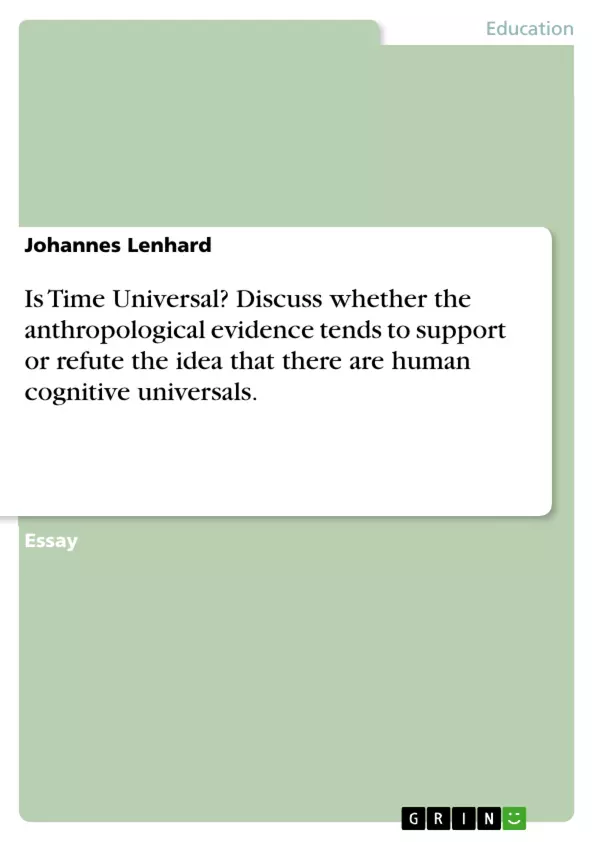Discuss whether the anthropological evidence tends to support or refute the idea that there are human cognitive universals.
The original debate on human universals was fought on metaphysical grounds long before anthropologists started to write ethnographies. Framed as the argument between Continental Rationalism and Anglo-Scottish Empiricism (see Gell, 1992:7), Descartes and Kant believed in a priori reason as constitutive of categories whereas Hume defends the ‘realness’ of sensitive experience. The former are supportive of the universalism, whereas the latter strictly deny it. This abstract controversy does not further concern us here, however. More concretely, the following essay deals with the universal character of ‘time’ in ethnographic studies. Looking at conceptions of time in the context of the Nuer (Evans-Pritchard, 1987) and most particularly Bali (Bloch, 1977; Geertz, 1993; Howe, 1981), the argument can be made that it is hardly possible to find ethnographic evidence against the notion of a universal concept of time. I will demonstrate with the above examples that on the one hand ethnographies can rarely be used to refute the universality of time but that secondly to differentiate the particularly ethnographic viewpoint is essential.
Inhaltsverzeichnis (Table of Contents)
- Nuer Apparent differences resolved
- Bali – Emphasis shifted
- The West - New technique
- Bias of ethnographic data and inadequate level of analysis
Zielsetzung und Themenschwerpunkte (Objectives and Key Themes)
This essay aims to explore the anthropological evidence surrounding the concept of human cognitive universals, specifically focusing on the notion of time. It investigates whether ethnographic data from different cultures supports or refutes the existence of a universal concept of time. Key themes explored include:- The universal character of time in ethnographic studies
- The role of cultural relativism in understanding different conceptions of time
- The limitations of ethnographic evidence in proving or disproving cognitive universals
- The influence of Western conceptions of time on anthropological interpretations
- The need for a more nuanced understanding of time that acknowledges both universal and culturally specific aspects
Zusammenfassung der Kapitel (Chapter Summaries)
Nuer Apparent differences resolved
This section examines the Nuer people's two-partite system of time, which includes an "oecological time" based on natural cycles and a "structural time" linked to social relationships. While the Nuer language lacks a word for "time" and their time-reckoning is seemingly different from Western conceptions, the author argues that these differences do not fundamentally contradict the idea of a universal concept of time.Bali – Emphasis shifted
The Balinese people have two calendars, a permutational and a luni-solar, which they use to classify time rather than measure its passage. This non-durational concept of time is linked to the Balinese idea of the person as a social role rather than an individual. While Geertz emphasizes the uniqueness of the Balinese conception, Bloch argues that it represents a different emphasis on time rather than a completely distinct concept.The West - New technique
This section discusses the Western conception of "industrial or clock time" which emerged with the industrial revolution. It argues that this dominant way of measuring time is not a universal blueprint but simply one facet of time, which has become the measuring stick for many anthropologists.Bias of ethnographic data and inadequate level of analysis
The author critically examines the limitations of ethnographic data in proving or disproving cognitive universals. He argues that the interpretations of ethnographic evidence are inherently biased by the observer's own perspective. Additionally, he questions the adequacy of relying solely on empirical evidence for understanding cognitive universals, suggesting that further research in psychology and linguistics may be necessary.Schlüsselwörter (Keywords)
This essay focuses on the intersection of anthropological evidence, cultural relativism, and cognitive universals, particularly as applied to the concept of time. Key terms and concepts explored include: time, cognitive universals, ethnographic evidence, cultural relativism, Nuer, Balinese, Western conceptions of time, industrial time, clock time, selective perception, selective observation, Durkheim, Geertz, Bloch, Howe, Gell, Adam, Thompson.Frequently Asked Questions about the Universality of Time
Is the concept of time a human cognitive universal?
The essay argues that despite cultural variations, it is difficult to find ethnographic evidence that completely refutes the existence of a universal concept of time.
How do the Nuer perceive time?
The Nuer use a two-part system: "ecological time" based on natural cycles and "structural time" based on social relationships and lineages.
What is unique about the Balinese conception of time?
Balinese time is often described as non-durational; they use calendars to classify the quality of days rather than to measure the linear passage of time.
What is "industrial or clock time"?
It is a Western technique of measuring time linearly and precisely, which emerged during the industrial revolution and is often mistakenly used as a universal standard by anthropologists.
Why is ethnographic data on time often biased?
Interpretations are often influenced by the observer's own cultural background (selective perception), which can lead to overemphasizing differences or missing universal cognitive traits.
- Arbeit zitieren
- Johannes Lenhard (Autor:in), 2012, Is Time Universal? Discuss whether the anthropological evidence tends to support or refute the idea that there are human cognitive universals., München, GRIN Verlag, https://www.grin.com/document/205566



